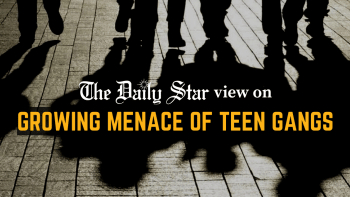Breaking the cycle of juvenile crime

As Bangladesh surges forward into a new era of political change, a darker tide is rising within our communities—a troubling spike in juvenile crime. While our leaders focus on national reform, an underground world of teen gangs and criminal networks is quietly taking root, ensnaring our youth in cycles of violence, crime, and despair.
But why are so many of our children and teenagers drawn into the shadows of gang culture? It is a complex web woven from poverty, broken homes, peer pressure, and a search for identity. In underserved neighbourhoods, gang life can offer a twisted sense of family, protection, and power. Without strong family support or access to opportunities, young people can feel adrift, easily lured by the false promises of gang culture.
Yet the influences stretch beyond poverty. Across economic divides, some youths are captivated by the glamorisation of gang life on social media and in popular culture, where figures of crime are idolised as symbols of defiance and "success." With such distorted role models, many teenagers begin to see violence and lawlessness as pathways to respect and recognition.
In the wake of recent political turmoil, many communities are vulnerable, left without the support and security they once relied on. The administrative reorganisation following the revolution has left gaps in law enforcement, creating space for gang activities to flourish. As political power shifted, gang leaders capitalised on the upheaval to recruit young people who feel isolated, restless, and overlooked.
Moreover, corruption among local power figures has emboldened gang networks, as some councillors and "big brothers" enable these gangs for their gain, using them as pawns for influence. This erosion of integrity at the local level has turned neighbourhoods into battlegrounds, where teenagers become unwitting soldiers and gang affiliation becomes a deadly game for respect.
What may start as minor acts of mischief often spirals into something much darker—drug distribution, theft, extortion, and even murder. Innocent people live in fear as communities are disrupted, their streets claimed by teenagers who see no future outside gang life. Schools are no longer sanctuaries but places of intimidation, where innocent students can fall victim to violence. Families are left shattered, watching as their children slip further away, trapped in a dangerous world with few exits.
The rise of teen gang culture calls for a united, strategic response—a plan that addresses root causes, not just symptoms. Here is a blueprint for a future where youth have a real chance to thrive:
Family and community engagement
Parents and guardians must be the first line of support, fostering open communication and offering a stable foundation. Communities can strengthen this support by creating safe spaces for young people, offering mentorship, mental health resources, and educational support. Government programmes can aid families facing financial hardship, reducing the vulnerabilities that gangs exploit.
Transforming schools into safe havens
Educational institutions have the power to reshape the trajectory of young lives. Beyond academics, schools must provide social and emotional support with activities that encourage positive self-expression—such as sports, arts, and leadership opportunities. Through community partnerships, students can engage with role models and mentors who demonstrate that success is attainable without resorting to violence.
A culture of awareness and empowerment
Awareness is key. Community organisations, local leaders, and the media must collaborate to shine a light on the dangers of gang life, offering clear, powerful messages that dispel the myths surrounding it. Real stories of resilience and redemption should be amplified so that young people see that strength lies in integrity, not in crime. Social campaigns, events, and programmes that celebrate positive achievements can create a sense of pride and belonging that gangs cannot offer.
Reinforcing law and order with compassionate solutions
While strengthening law enforcement is essential, it must go hand in hand with rehabilitation efforts. Quick and fair punishment serves as a deterrent, but so does the chance at a future. By establishing rehabilitation programmes for juvenile offenders, we can guide them back to a constructive path. Police should also work in partnership with community organisations, ensuring they are not only enforcing laws but also supporting prevention efforts.
Bangladesh stands at a pivotal moment. The path we choose today will shape our future for decades to come. By ignoring the rise of juvenile crime, we risk losing a generation to violence, perpetuating cycles of poverty and fear. Yet, by coming together—parents, teachers, community leaders, and law enforcement—we can reclaim our neighbourhoods, giving our youth the chance to thrive in a world free of violence and corruption.
Bangladesh's youth are not inherently lost or violent. They are searching for purpose and direction in a society that too often looks the other way. It is up to us to show them that real power lies in courage, honesty, and lifting each other up. By building a society that values resilience and respect, we can protect our young people from the lure of gang culture and create a safer, more just Bangladesh.
The time for action is now. Let us break the cycle, together.
Dr Rakib Al Hasan is the founder & executive director of the Centre for Partnership Initiative. He can be reached at [email protected]. His X (former Twitter) handle is @rakibalhasan_bd
Views expressed in this article are the author's own.
Follow The Daily Star Opinion on Facebook for the latest opinions, commentaries and analyses by experts and professionals. To contribute your article or letter to The Daily Star Opinion, see our guidelines for submission.

 For all latest news, follow The Daily Star's Google News channel.
For all latest news, follow The Daily Star's Google News channel. 






Comments